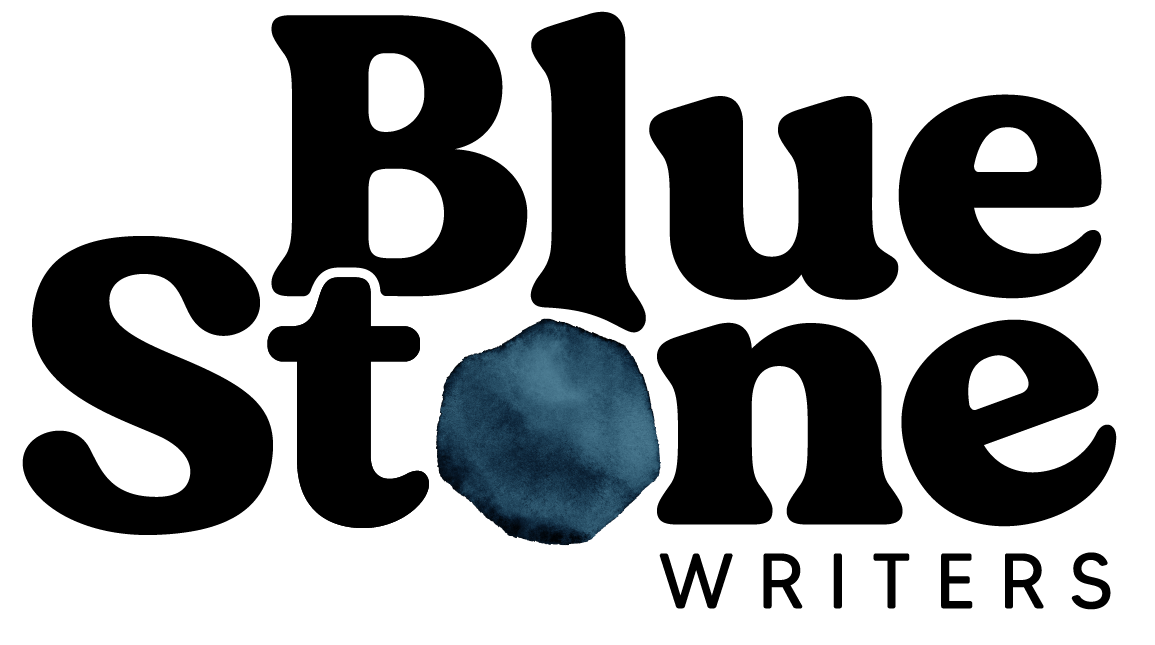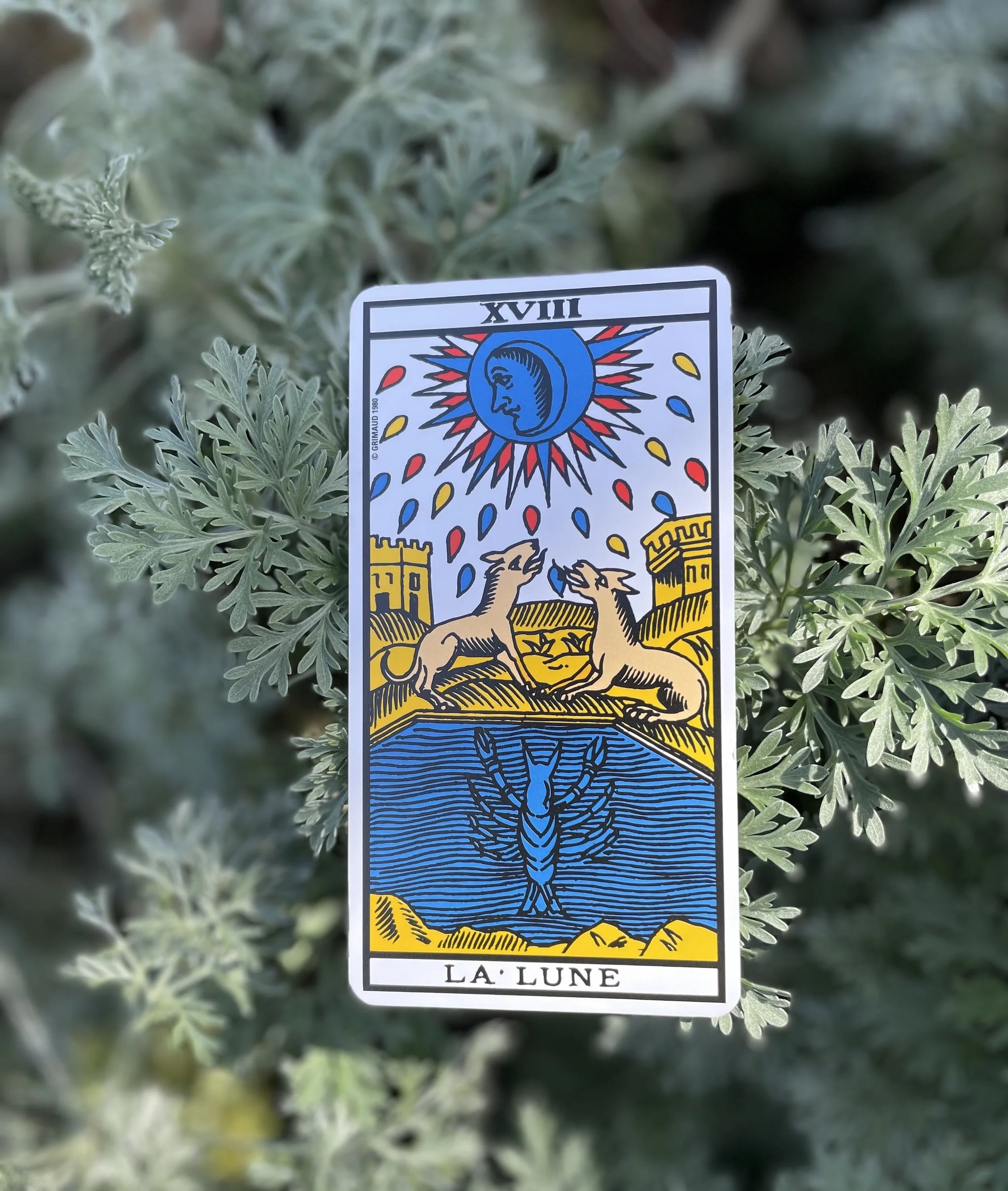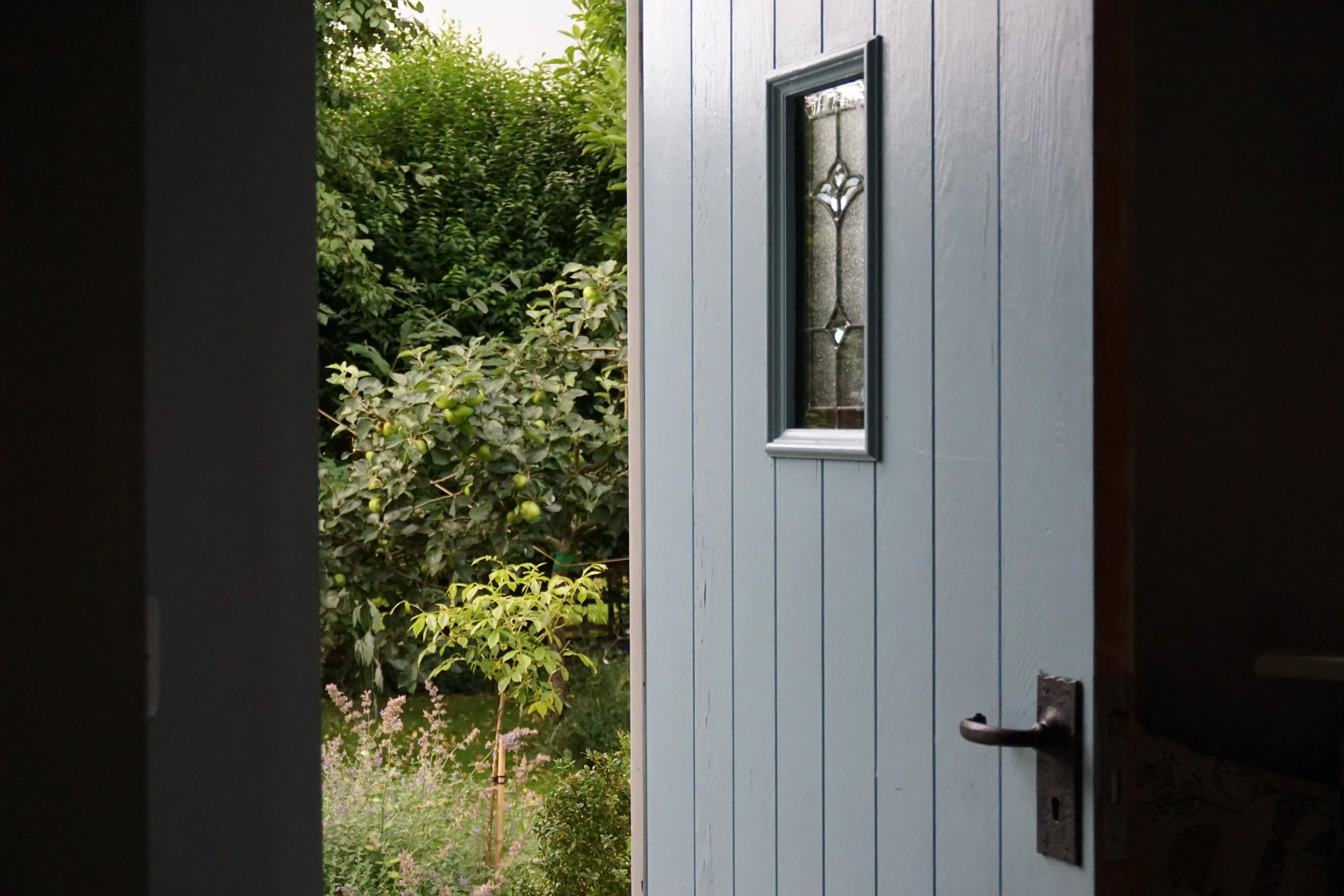What is being obscured? What is being revealed?
Lunar Liminality
Weather and the Body
Hello, Solstice
In-Yun and the Power of Connection
It's All About Perspective
Abundance
Abundance in the garden seen here in all its glory. Esperanza (Tecoma stans). We stan.
A lot of folks here in Austin have been paying close attention, not only to what has survived this long, hot summer, but to what has thrived. Neighbors, naturalists, landscapers and bird watchers are all sharing their findings with one another.
This Esperanza right here is one such plant that folks agree is a hearty contender, and it’s definitely one that has thrived in my garden despite the extreme heat, drought, and the antics of various critters including squirrels and my dog—who likes to dart around said plants in search of said squirrels.
Not everything has survived the drought, of course, but there are pockets of abundance in my backyard. There is a neon orange oriole drinking at one of my many birdbaths as I write this. An oriole! And there are hummingbirds sipping nectar, and dragonflies buzzing about, and cacti growing green bud after green bud.
My motto for the membership year ahead is Abundance. Just one word. That’s it. Abundance.
It’s about naming our creative desires, taking the time to dream, and seeking support from community when we don’t have everything we need on our own. It’s what inspired the class I’m co-teaching with my friend and romance writer Megan Clark. When she knew I was feeling a little lost and tired in my novel revisions, Megan offered to sit down with me, do some brainstorming about my novel, and—I quote—“generally just have a celebration of its badassery”.
Well, hot damn.
This is what I mean by abundance. It very often shows up in community. It arrives via the wisdom of a friend in my trusted writers group, or in the brilliant and inspiring work of a mentoring client, or the insightful comments from a student in a college creative writing class.
Sometimes in the writing life, it can be easy to focus on what isn’t there—the recognition, the finish line, the acceptance, the solution to a tricky plot problem, or even the coffee that has mysteriously evaporated from our mug. Srsly, where did it go?
I’m not, of course, suggesting that you see everything as abundant. Y’all know I don’t really go in for that kind of thinking. More that you take time to pause and reflect on the pockets of abundance—the moments of general badassery—that weave into the many-textured fabric that is your writing life.
I mean, what do we have to lose? In celebrating what’s really good?
Guided Writing: Abundance in Story—A Reflective/Generative Set of Prompts*
Members will find this guided writing compliments the previous members-only blog post. You may want to check that out first.
*This is absolutely an activity done best with a writing partner or writers group where you can share abundance with one another.
The whole activity takes about 25 minutes, a Pomodoro’s worth of creative time:
First of all, just take a damn breath. Sometimes we forget, it’s okay. Close your eyes and allow yourself three really luxurious deep breaths. Enjoy.
Next, consider the following: Where do others see abundance in your work? Do they admire you for taking risks? Have folks told you your writing is lush, or daring, or hilarious, or dark, or weird, or heartbreaking? Did a fellow writer in workshop admire your ability to write dialogue? Was an ex afraid of the focus you lent your novel project? Has a family member paused with wonder at the way you spin a tale, enter contests, or make up worlds? Did a third grade teacher once call you a genius? These are all rich with abundance. Write for 5.5 minutes.
Okay. Take a deep breath. Now. Where do YOU see abundance in your work? Do you love the way your characters love each other? Or despise each other? Do you love that one tree in the story you’re working on—you know the one, where they finally realize the truth? Do you like that you have a scene involving chocolate croissants which happen to be your favorite breakfast treat in the whole wide world? Do you love the way you describe a sky, a creature, a haunting, a heated conversation, a dream? Write for 6.5 minutes.
Alright, and how do you find abundance in your creative process? Like, how do you create ease and space and joy and lightness in your work? What does it look like when you’re writing with abundance? It doesn’t mean you have tons of time, necessarily, though you might prefer it. It also doesn’t mean that you’re working on something lighthearted. What it means is—put quite simply—that it feels good to write, that you’re glad to have done it. Declare it to the page. Write for 6.5 minutes.
Okay, that’s amazing. Take a much deserved breath. Now. How do you ensure that you can have this kind of abundant time/space/mode of creating on a regular basis? Let’s say…once a week? That feels more than fair. Write for 5.5 minutes, describing what tools/people/spaces help you seek abundance in creation.
Take a full minute to stare into space. Stare for one minute.
Take a deep breath and thank yourself for reflecting on abundance in the writing life. Then share the prompts/your reflections with a trusted writer-friend.
Want more guided writing? Members have access to more guided writing via the members-only blog. Just one of the many perks of being a Blue Stone!
Writing with the Queens
The Queens as depicted in the Modern Witch Tarot Deck by Lisa Sterle.
The Queens are showing up a lot lately. In my New Moon Tarot readings last week, there were multiple Queens making an appearance, and before that I was inspired to weave them into our four-week workshop craft study*.
*If you’re currently taking that class, this will feel like an extension of our study with the Queens.
I focus on the Queens in the Lantern for the Path series (currently on sale, YES), and there are old podcast episodes on Queen of Cups, Queen of Swords, and Queen of Swords again, so there’s lots out there if this post sparks your interest and you want to dig into this energy.
This is not so much a deep, scholarly dive into the Queens themselves as it is an opportunity to use elements of each archetype for guided writing and reflection. Enjoy!
Guided Writing: Queens as Creative Ally
Queens are an excellent ally for the creative life because Queens are super comfortable with SELF. Queen of Cups dives deep into the emotional life, Queen of Pentacles lives in rhythm with the seasons, Queen of Wands steps into a room and everyone goes Who’s that and what is their magic? And Queen of Swords sets boundaries and knows the true power of the sacred no.
Let’s invite these separate energies into a quick reflection + scene writing activity that takes about 25 minutes, a Pomodoro’s worth of creative time:
Inspired by Queen of Wands: What is your individual magic when it comes to writing? What are you own superpowers? Example from my own life: I have a background in studying creative nonfiction and am always pulling from memory. My memory-inspired descriptions are always more powerful for my fictional characters when I’m pulling from real life. I also think I’m great with chapter endings. And I love to write gross stuff. These are a few of my Queen of Wands powers. What are yours? Write for 4.5 minutes.
Inspired by Queen of Pentacles: Consider the main character in your WIP or a brand new character you’re dreaming up on the spot. What place do they go when they need to feel completely themselves? Is it indoors, outdoors? Is it populated, or is your character the only one there? What is the temperature/smell of the air? What does your character do here, if anything? Write for 6.5 minutes.
Inspired by Queen of Cups: Imagine that your character has been barred from this special place or somehow prevented from returning. In order to regain access, they have to express their feelings, perhaps on a difficult subject which they find uncomfortable (or others find uncomfortable), but they know if they never speak up and let their feelings be known, they’ll never be able to return. Write for 10-12 minutes, allowing your character to be as messy as they like. This doesn’t have to be a polished plea or rehearsed speech; this can be your character speaking through their tears/screams/nervous laughter/all of the above.
Take a deep breath. That was a lot. Thank your character for being whatever they needed to be.
Inspired by Queen of Swords: List a few writerly activities you’d like to engage in this week that support your creative life. Take a few minutes to list as many as you like, and then choose one of these activities to prioritize. One of these might be returning to the scene you began crafting via these prompts! Declare that you will carve out time for this activity no matter what competes with it this coming week. Let Queen of Swords inspire you with the power of the sacred no.
Take a deep breath and take pride in carving out 25 minutes for the writing life. Thank yourself and all the Queen-like selves within you.
Want more guided writing? Members have access to more guided writing via the members-only blog. Just one of the many perks of being a Blue Stone!
A Room With a View and Writer-Friends
The library at Foundation House.
Sometimes we writers have romantic notions of a Stephen King-like writing space (or what we imagine that to be). You know the one: a house in the Maine woods where no one can disturb you, and all you need is a coffee pot, a typewriter, and the company of a few ghosts. This doesn’t work for everyone, though, and it definitely doesn’t work for me—in part because I love takeaway coffee.
One year and one month ago, I was lucky to be an artist-in-residence at Foundation House in Greenwich, CT, the farthest thing from a cabin in the woods but with the same purpose—focus on your work, that’s all you have to do.
There was plenty of room for us residents to take up space in the rooms and on the grounds of this grand estate. My fellow resident and LEAP OUT special guest-artist Les James had one space for writing and another for her painting. Writer and comedian Gabe Bergado worked in a grand dining space with dark wood paneling and a view down to the tennis courts and the labyrinth (yep!). We all moved around, though. There was room to try out different creative corners.
I was thrilled to discover the library and table pictured here—a room filled with books and midcentury modern decor. I love working at a big table with a view; this one looked out toward the property’s orchards and a down to the pond. Early on, however, I found myself easily distracted. Sure, the grounds begged to be explored, so that was excuse enough to leave the table, but the thing is, I was just having trouble working alone.
When I arrived at Foundation House, it had been a long while since I’d had time and space to dedicate to my writing. I’d had a rough year health-wise, and I was tired. A couple days into the residency, fellow writer-in-residence Gabe started to join me in the library. Almost immediately, I began to fly through my pages, editing old ideas and dreaming up new ones. Some of you may be thinking right now, “That sounds like the practice of body doubling!” and yes, this is absolutely true.
It’s not that writing feels like an odious or boring task to me—I mean, sure, it can sometimes, but mostly I wish to write. I long to write. I just think it can be tough to find motivation when we’re… 1) distracted by other obligations/responsibilities, 2) feeling the echoes of rejection and wondering why we still do this, 3) just plain tired. Having people in our vicinity—bonus points for artists we trust and admire—reminds us that everyone is just trying to make things, no matter where they are in the phases of creation. Everyone wants to feel worthy of a cabin in the Maine woods that is mostly for writing and sometimes for ghosts, but not everybody wants to hang out there all the time. Some of us like takeaway coffee.
Inspired by the creative work and support that I’ve experienced on residencies and on retreat, as well as the inspiring connections formed in the Blue Stones membership community, I created the Midsummer Retreat. With summer officially underway here in central Texas, I’ve already felt the lulls in my writing time. The thought process can go like this: I wish I were going on vacation, I wish I were already done, I wish this wasn’t so hard. When these are actually phrases that veil a deeper, heavier thought: I wish I didn’t feel alone in this process today.
We can’t always go on retreat or attend a residency, but virtual community can be a true balm between these luxuries! I hope you’ll consider communing with such writers at the Midsummer Retreat, knowing that you can also spend the day not speaking with a single soul, maybe picturing a cabin in the trees, on a beautiful pond, knowing all you have to do is WRITE.
Inspired by the library at Foundation House, here’s a 25-minute character experiment to help you practice both physicality and interiority, as well as the sheer power of place.
Guided Writing: Inviting Characters to the Table (Or Near It Anyway)
Imagine a character who finds a lovely room—this can be inviting to the character because of who that character is and what they enjoy (doesn’t have to be my midcentury library + round table with view of duck pond). This can be a character in your WIP or someone brand new. This character (and all the characters included in these exercises) can also be real people—you just might find yourself getting a little experimental. Describe the inviting room and how your character enters the space, how they make themselves at home here. Write for seven minutes.
Now allow another character to enter the room—just one—and see how your first character reacts. Do they feel protective re: this special space? Are they happy to share it? Watch how your character notices this new character’s physicality. How do they interpret the personality based on body language, what they’re wearing, and how they speak? Write for another seven minutes, allowing your characters to observe one another.
Invite a third character—this time, someone who really shifts the dynamic. Their energy introduces something new to the space. Write some dialogue here, showing how the first two characters perceive this energy shift. Take 11-12 minutes for this conversation. Keep in mind that the first two characters don’t necessarily have to engage with the third character at all! You can do whatever you like—have them interact, or have them simply observe and talk to each other, speculate or even gossip. Even without interacting, this third character can still have an impact on how the room feels, and how your first two characters feel in it.
Take a deep breath and take pride in carving out 25 minutes for the writing life. Thank yourself and the room you’re writing in for making it possible.
Want more guided writing? Members have access to more guided writing via the members-only blog. Just one of the many perks of being a Blue Stone!











